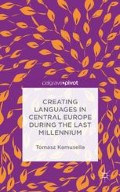Abstract
The chapter sketches a panorama of the spread of monotheistic religions in premodern Europe. Each such religion operated through its own specific holy language, written down in its own script, and connected to a given holy book. These holy languages were usually much removed from everyday speech (vernaculars). The Reformation opened the gate for the use of vernaculars in writing, first in Western and Central Europe, before the process spread to Eastern Europe and the Balkans between the eighteenth and twentieth centuries. Many new languages were created in this manner.
Access this chapter
Tax calculation will be finalised at checkout
Purchases are for personal use only
Preview
Unable to display preview. Download preview PDF.
Author information
Authors and Affiliations
Copyright information
© 2015 Tomasz Kamusella
About this chapter
Cite this chapter
Kamusella, T. (2015). Setting the Stage in Europe. In: Creating Languages in Central Europe During the Last Millennium. Palgrave Pivot, London. https://doi.org/10.1057/9781137507846_3
Download citation
DOI: https://doi.org/10.1057/9781137507846_3
Publisher Name: Palgrave Pivot, London
Print ISBN: 978-1-349-50606-4
Online ISBN: 978-1-137-50784-6
eBook Packages: Palgrave Language & Linguistics CollectionEducation (R0)

